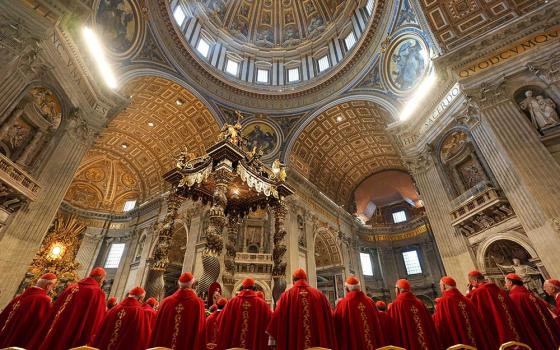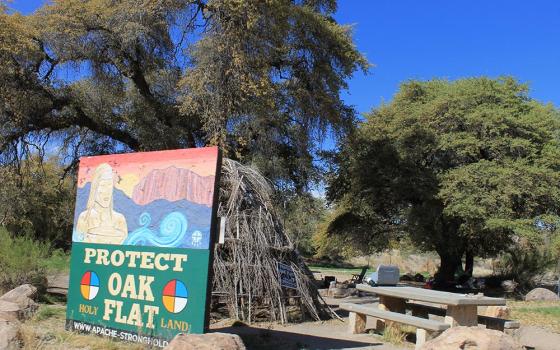
(Unsplash/Abdullah Öğük)
The conclave begins next Wednesday, and many are speculating and imagining which cardinal might be elected; perhaps even what name they might select. However, there is another aspect of the pontificate that also conveys meaning and reflects the intention of the new pope: his motto.
While not always portending the disposition and priorities of a new pontiff, a motto can reveal insight about his thinking, spirituality or pastoral interests. For example, John Paul II chose Totus Tuus ("totally yours"), which reflected his devotion to Mary as a path to Christ. Benedict XVI had Cooperatores veritatis ("cooperators with the truth"), which is not surprising given his lifelong commitment to theological study and teaching, as well as his decades-long work at the then-Congregation for the Doctrine of the Faith.
Pope Francis selected Miserando atque eligendo ("having mercy, he chose him"), a reference to a homily by St. Bede the Venerable on Jesus' calling of St. Matthew the tax collector in the gospels. It's no secret that Pope Francis loved Caravaggio's "Calling of St. Matthew" and the theme of mercy permeated every aspect of the late pope's teaching and ministry. It is fair to say that this motto set the stage for what we could expect about the Francis pontificate.
So while we cannot know what the next pontifical motto will be, I have a suggestion to offer for the future pope's consideration: Nolite timere ("Be Not Afraid").
While a handful of local bishops have adopted this reference to John 6:20 over the years and John Paul II was fond of exhorting young people to heed the command, no pope has yet embraced this expression from Christ as their official motto.
Picture a pope whose message of hope over fear leads to ecclesiastical policies that broaden the "big tent" of Catholicism to include all those who feel the inhospitality of a faith community haunted by fear of those whose views, experiences and life circumstances may be unlike the majority.
It is fair to say that we live in a time of fear, governed by what philosopher Martha Nussbaum termed "the monarchy of fear." When there is violent conflict around the globe, rising polarization and autocratic governments, increasing climate crises and surging income inequality, Christians and all people of good will need moral, spiritual and practical guidance that offers hope in the face of fear.
The next pope will need to be a spiritual leader who is himself unafraid. Nussbaum warns: "Fear all too often blocks rational deliberation, poisons hope and impedes constructive cooperation for a better future." The motto "do not be afraid" would be a good daily reminder for the next bishop of Rome to choose hope over fear in all his decision-making, words and actions.
One of Pope Francis' great legacies is the way he exercised his ordinary magisterium fearlessly, writing about climate change in "Laudato Si', on Care for Our Common Home" and Laudate Deum, addressing the terrifying period of pandemic and global insecurity in Fratelli tutti and exhorting all who would listen to strive for holiness by living the beatitudes in Gaudete et exsultate. While his successor will be a different person with different gifts and challenges, the world will continue to look to the Holy Father for a message and example of Christian hope that is expansive rather than limiting, inclusive rather than exclusive and timely rather than atemporal.
What if the next pope took to heart the admonition of Jesus to "be not afraid" in a manner like Pope Francis incorporated his motto's emphasis on mercy? Imagine the kinds of homilies and catechetical reflections we might hear centered on how Christian discipleship demands that we not succumb to fear, which Nussbaum rightly notes is an "intensely narcissistic" emotion.
Fear leads one to focus on oneself out of a real or perceived belief that there is a danger threatening their safety or comfort. It leads to the self-granting permission to ignore or reject others, dehumanize those viewed as the object of fear, and adopt a stance of disinterest and apathy to the suffering of others.
Picture a pope whose message of hope over fear leads to ecclesiastical policies that broaden the "big tent" of Catholicism to include all those who feel the inhospitality of a faith community haunted by fear of those whose views, experiences and life circumstances may be unlike the majority.
Advertisement
Consider a pope who, like Jesus, sincerely desires and prays that "all may be one" (John 17:21) but does not let superficial claims to unity prevent bold statements and actions that follow Jesus's own outreach in preaching and ministry.
One of the things Pope Francis did well was lay the foundation for the possibility of real change in the future. And this is what some church leaders — those who have been vocally or privately critical of Francis — have feared.
The emphasis on synodality has decentered some of the ecclesiastical power that has, up to now, been jealously possessed and guarded by a limited number of ordained men. With Pope Francis's appointment of some lay and religious women, and a few lay men, to positions of concrete leadership and authority in the Vatican in recent years, we have seen small glimpses of another way for the church to exist. But this should be just the beginning.
When it comes to "hot-button" issues, like the admission of women to the ordained diaconate, or the return to optional clerical celibacy in the Latin West, or the simple and universal recognition of diverse sexualities and genders, or the greater involvement of the laity, the next pope could lead the global church by asking: "Of what are we so afraid?"
A pope who heeds Jesus' call to be unafraid can look to Christ's own model of radical inclusion and equality, even if it disturbs the status quo; even if it upsets religious leaders afraid of losing their power; even if it has never been done before.
I am not suggesting recklessness or arbitrary change; I'm arguing that fear too often gets in the way of recognizing what God desires for us as a church and world. Fear, as Nussbaum writes, is a "dimming preoccupation," limiting the horizons of what we think is possible. If we can overcome fear, we might remember that nothing is impossible for God (Luke 1:37).







